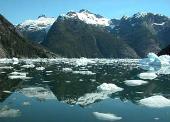Arctic winter sea ice sees great decline in its depth
 For the first time since records commenced in the early 1990s, the thickness of sea ice in the Artic, tremendously decreased last winter. The research, undertaken by British scientists has shown a of loss in the thickness of the northern ice cap following the record loss of ice in the summer of 2007.
For the first time since records commenced in the early 1990s, the thickness of sea ice in the Artic, tremendously decreased last winter. The research, undertaken by British scientists has shown a of loss in the thickness of the northern ice cap following the record loss of ice in the summer of 2007.
However, the weather was not really warm then.
These latest findings have been published in the journal Geophysical Research Letters and it suggest that there could be an decrease in the Artic sea ice, since the water temperature rises as the ice parts away. The second-lowest extent was recorded for the sea-ice this summer, and this comes in spite of quite cool air temperatures.
“It is too soon to say whether the downward trend would continue and lead to summer sea ice disappearing even faster than forecast. It's dangerous to extrapolate out because colder weather would mean the ice could recover again,” reported Katharine Giles of the Centre for Polar Observation and Modelling at University College London, who led this study.
The study was partly funded by the Natural Environment Research Council and the European Union. It would be surprising to know, that sea ice’s thickness in the Artic was nearly the same in the five winters from 2002-2006. However, during last winter it declined 10% or 26cm. Sadly, the loss was nearly double the average in the parts of the Western Artic, where last summer the highest loss was recorded.
“There's clearly a decline over the last 30 years and we can detect a human signal in that, but the change in the last couple of years could be due to natural fluctuations in the weather,” warned Vicky Pope, the Met Office's leading adviser to the government on climate change.
Giles concluded, “Other causes of sea ice changes could include ocean currents and wind piling up ice, making it important to measure both thickness and extent to calculate total volume.”